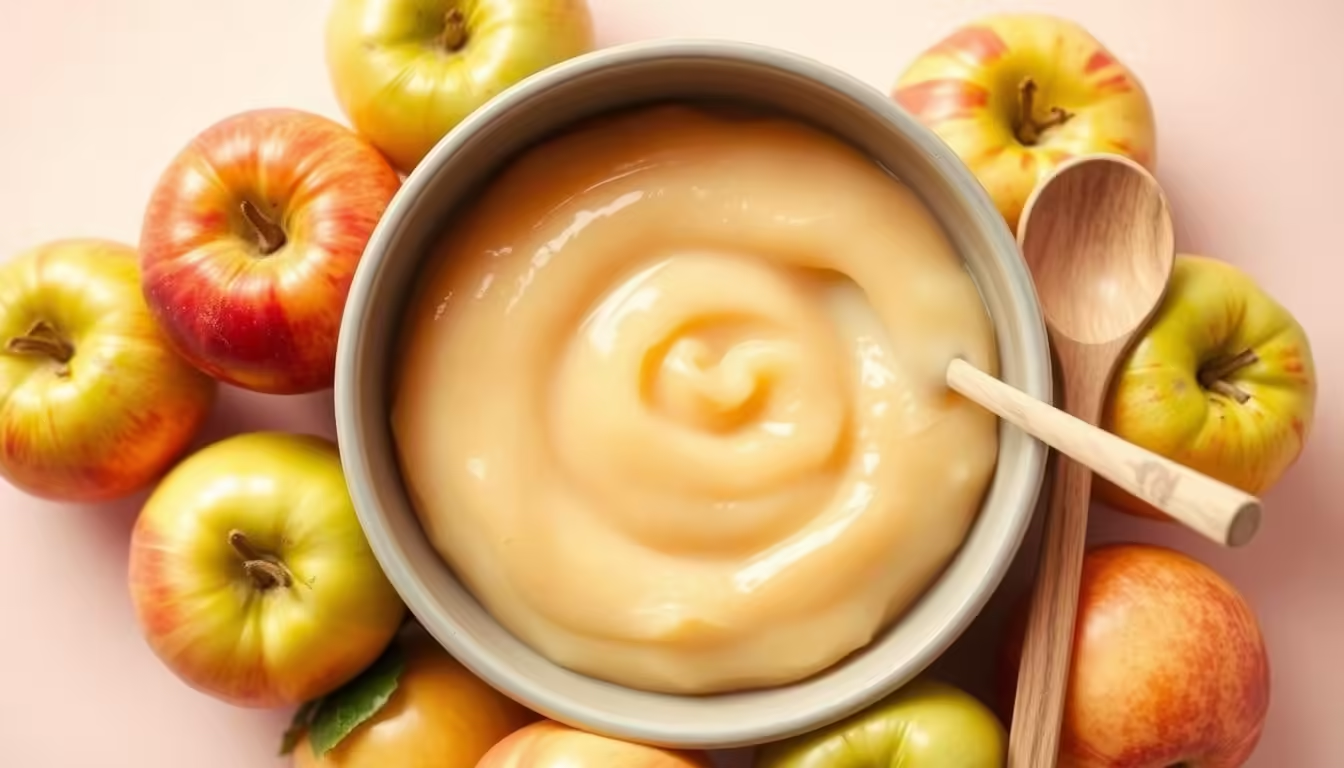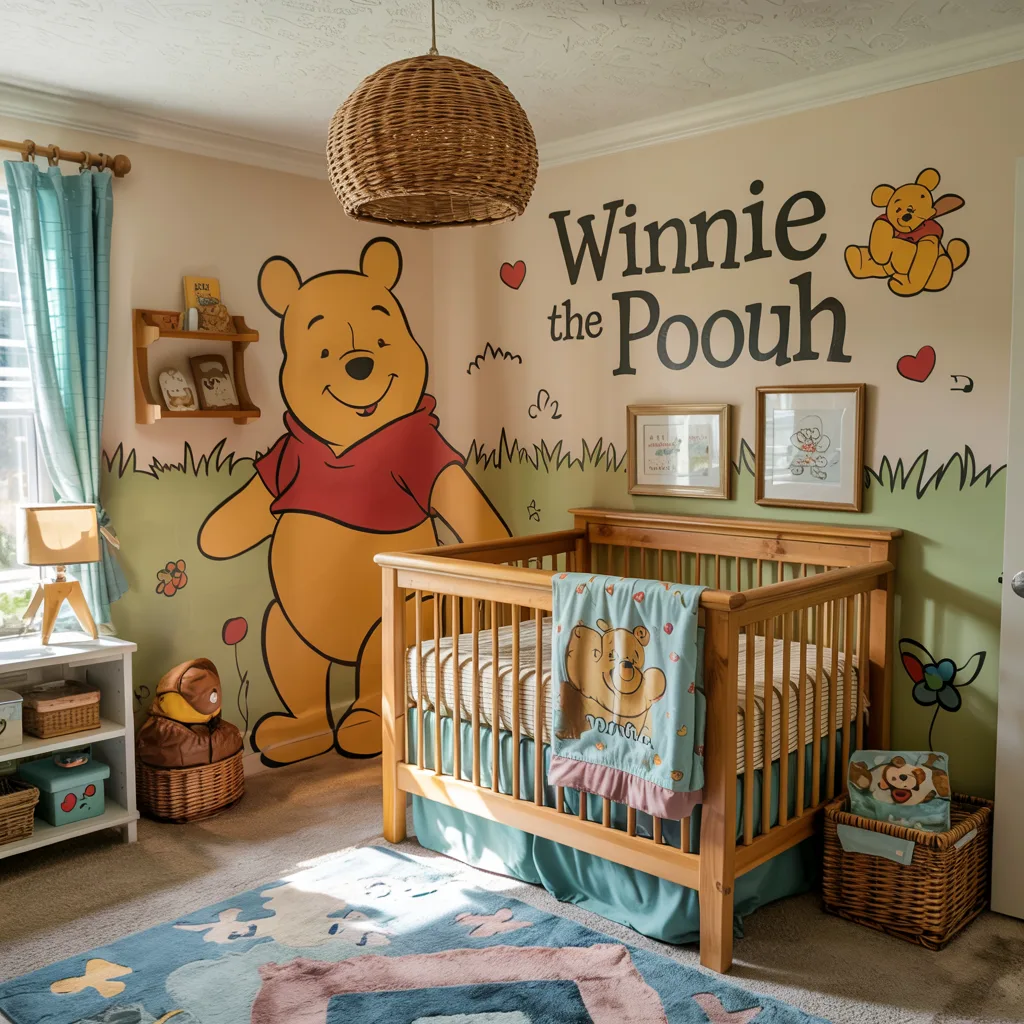Starting your baby on solid foods is both thrilling and nerve-wracking. You aim to give them the healthiest and tastiest meals. Homemade apple baby food is a fantastic choice. This guide will show you how to make nutritious apple purees that are full of vitamins, minerals, and fiber.
Key Takeaways
- Homemade apple baby food is a nutritious and easy-to-prepare first food for your little one.
- Apples are a great source of fiber, vitamin C, antioxidants, and hydration for your baby.
- You can store homemade apple baby food in the fridge for up to 4 days or freeze it for up to 4 months.
- The recipe requires just 6 apples, 1/2 cup of water, and 1/4 teaspoon of cinnamon.
- Cooking time for tender apples is approximately 10-15 minutes.
Table of Contents
Introduction to Homemade Apple Baby Food
Homemade apple baby food is a great first food for babies. Making it at home lets you control what goes into it. This way, you can be sure your baby gets only the best.
Apples are full of fiber, vitamin C, and antioxidants. These nutrients make apples a perfect choice for introducing solids to your baby.
Why Make Homemade Apple Puree for Your Baby?
Homemade apple puree has many benefits over store-bought options. It avoids heavy metals and arsenic found in some commercial baby foods. Making it yourself also lets you adjust the texture to your baby’s liking.
Benefits of Apples for Babies
Apples are packed with nutrients, making them a great first food. They’re full of dietary fiber for healthy digestion. They also have vitamin C for immune and skin health.
Apples are also good for a baby’s gut health. They contain polyphenols that help increase good bacteria. Plus, apples can be mixed with other fruits and veggies for tasty, nutritious purees.
By adding homemade apple puree to your baby’s diet, you’re giving them a delicious and healthy start to eating solids.
“Apples are the second most consumed fruit in the US after bananas, and they’re a fantastic choice for a baby’s first foods.”
Ingredients Needed for Apple Baby Food
To make delicious homemade apple baby food, you need apples, water, and a bit of cinnamon if you like. The key is picking the right apples.
Types of Apples to Use
Choose sweet and firm apples that are easy to digest for your baby. Here are some great options:
- Gala apples: Sweet, mild flavor and crisp texture make them perfect for baby food.
- Honeycrisp apples: Juicy, slightly tart, and sweet, Honeycrisps are a favorite for apple baby food.
- Fuji apples: Natural sweetness and soft flesh make Fujis great for smooth, creamy puree.
- Pink Lady apples: Balanced, slightly tart flavor is great for baby food recipes.
Avoid tart apples as they might be too acidic for babies. Sweet, mild apples are best for taste and digestion.
| Apple Variety | Sweetness Level | Texture | Recommended for Baby Food |
|---|---|---|---|
| Gala | Sweet | Crisp | Yes |
| Honeycrisp | Sweet, Slightly Tart | Juicy | Yes |
| Fuji | Sweet | Soft | Yes |
| Pink Lady | Balanced, Slightly Tart | Crisp | Yes |
| Granny Smith | Tart | Firm | No |
Using the right apples makes a smooth, tasty, and healthy apple puree your baby will enjoy.
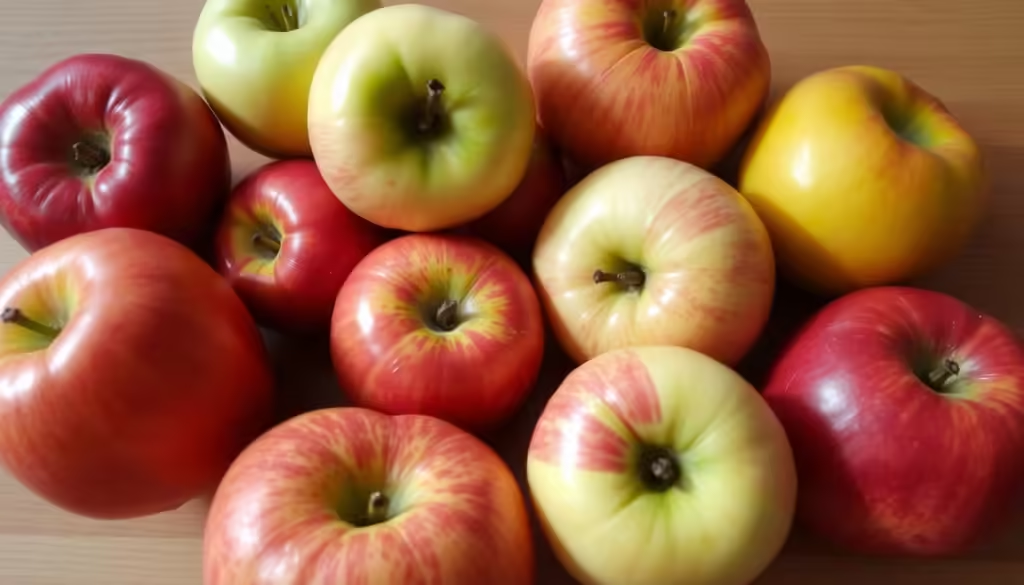
Step-by-Step Instructions for Making Apple Baby Food
Making homemade apple baby food is easy and rewarding. It lets you give your baby a healthy, preservative-free snack. Here’s how to make tasty apple puree for your baby:
- First, wash and peel 2-3 medium apples. This will give you about 5 ounces of puree.
- Then, cut the apples into 1-inch pieces. Put them in a steamer basket or saucepan.
- Steam the apple chunks for 10 minutes, or until they’re soft. Or, boil them in a little water until they’re tender.
- After cooking, blend the apples in a blender or food processor. Add a bit of water for a smooth texture. You might need more water to get the right consistency.
- For extra taste and color, squeeze a bit of lemon juice into the mix.
This recipe makes about 3/4 cup of apple puree. You can keep it in the fridge for up to 4 days or freeze it for 4 months. To thaw frozen puree, just place the cubes in a bowl with hot water.
| Preparation Time | Recommended Equipment | Ratio of Apples to Water |
|---|---|---|
| 25 minutes | Vitamix Blender | Start with a few tablespoons of water, add more as needed |
When introducing new foods to your baby, start with one at a time. Wait a few days before trying another. This helps spot any allergies. Enjoy making your own how to make homemade apple baby food, apple puree recipe, and easy baby food recipes!
Cooking Methods for Apple Baby Puree
When making homemade apple puree for your baby, you have a few different cooking methods to choose from. Let’s explore the pros and cons of the two most common techniques – steaming and boiling.
Steaming Apples for Baby Food
Steaming apples is often considered the superior method for preserving the fruit’s natural nutrients and flavors. By gently cooking the apples above simmering water, you can create a smooth, creamy puree. This method helps the apples retain more of their vitamins and minerals compared to boiling.
The steaming process also helps the apples maintain their color and appealing texture.
- Wash, peel, and core the apples.
- Place the apple slices in a steamer basket and set over a pot of simmering water.
- Steam the apples for 12-15 minutes, or until very soft.
- Transfer the cooked apples to a blender or food processor and puree until smooth.
- Add a small amount of the steaming liquid if needed to reach your desired consistency.
Boiling Apples for Baby Food
While not quite as nutrient-preserving as steaming, boiling apples is a simple and straightforward method. It still produces a delicious and nutritious puree. The key is to carefully monitor the cooking time to avoid overcooking, which can lead to some nutrient loss.
- Peel, core, and dice the apples into 1-inch pieces.
- Place the apple pieces in a saucepan and cover with water.
- Bring the water to a boil, then reduce heat and simmer for 10-12 minutes, until the apples are very soft.
- Drain the apples, reserving some of the cooking liquid.
- Mash or blend the apples, adding the reserved liquid as needed to achieve your desired consistency.
Whichever cooking method you choose, homemade apple puree is a wonderfully nutritious and easy-to-make first food for your baby. Enjoy the process and savor the delicious results!
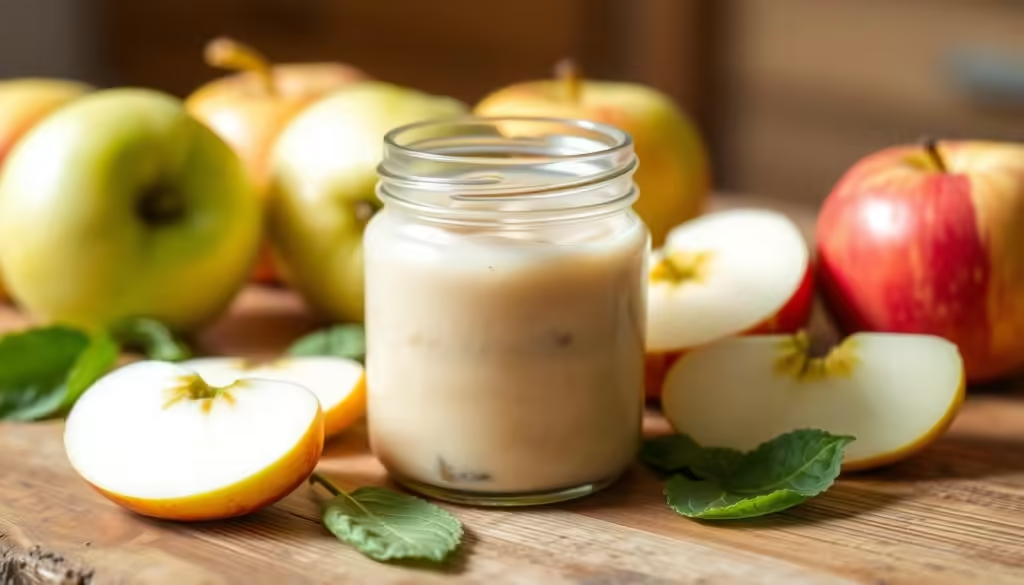
Storing and Freezing Apple Baby Food
Homemade apple baby food is a great choice for your baby. But, it’s important to store it right to keep it fresh and safe. Here’s how to store and freeze your apple puree:
Refrigerator Storage
You can keep apple baby food in the fridge for up to 4 days. Use airtight containers or jars to keep it fresh. Always check the food for any signs of spoilage before serving.
Freezing Apple Puree
Freezing is a good option for longer storage. You can freeze apple baby food for up to 3 months. Pour the puree into ice cube trays or small containers before freezing.
When you’re ready to serve, thaw the frozen puree in the fridge overnight. You can also thaw it faster by running the container under cold water. Never refreeze thawed baby food to keep it safe and quality.
Labeling and Organization
Label your containers with the date and what’s inside. This helps you keep track of your freezer contents. Portion the puree into small servings for easier feeding and thawing.
By following these tips, you can enjoy homemade apple baby food. This ensures your baby gets the best nutrition safely.
| Storage Method | Shelf Life |
|---|---|
| Refrigerator | Up to 4 days |
| Freezer | Up to 3 months |
“Proper storage and freezing of homemade apple baby food is essential for maintaining its quality and safety.”
Introducing Solids and Feeding Tips
Timing is everything when introducing solid foods to your baby. Experts say start around 6 months. Your baby should be able to sit up and hold their head steady. Look for signs like losing the tongue-thrust reflex.
At first, breast milk or formula will still be the main food. But, solid foods add important nutrients like iron and zinc. Start with one new food at a time. Give 8 to 10 tries before deciding if your baby likes it.
Choose foods without added sugars, high sodium, or honey. Avoid unpasteurized dairy and foods that could choke your baby. Start with single-ingredient purées and then mix them as your baby gets older.
Make sure to cook homemade baby foods to keep nutrients in. Freeze any leftovers. Don’t feed from baby food jars to avoid contamination. Use a spoon to feed your baby. Introduce a cup around 6 months, starting with water. Wait until your baby is 12 months old before giving juice.
By following these baby food feeding guidelines and signs baby is ready for solids, you can ensure a smooth and nutritious when to introduce solids experience for your little one.
| Feeding Recommendation | Guideline |
|---|---|
| Starting Solid Foods | Around 6 months of age |
| Breast Milk or Formula | Still provide majority of nutrition during transition |
| Nutrient-Rich Solid Foods | Offer essential nutrients like iron and zinc |
| New Food Introduction | One at a time, allowing 8-10 tries |
| Food Restrictions | Avoid added sugars, high sodium, honey, unpasteurized dairy, choking hazards |
| Food Progression | Start with purees, then mixed purees, and finally a variety of textures |
| Homemade Baby Food | Cook to preserve nutrients, freeze portions for later |
| Feeding Method | Spoon food into bowl, avoid feeding directly from jars |
| Cup Introduction | Around 6 months, start with water, avoid juice until 12 months |
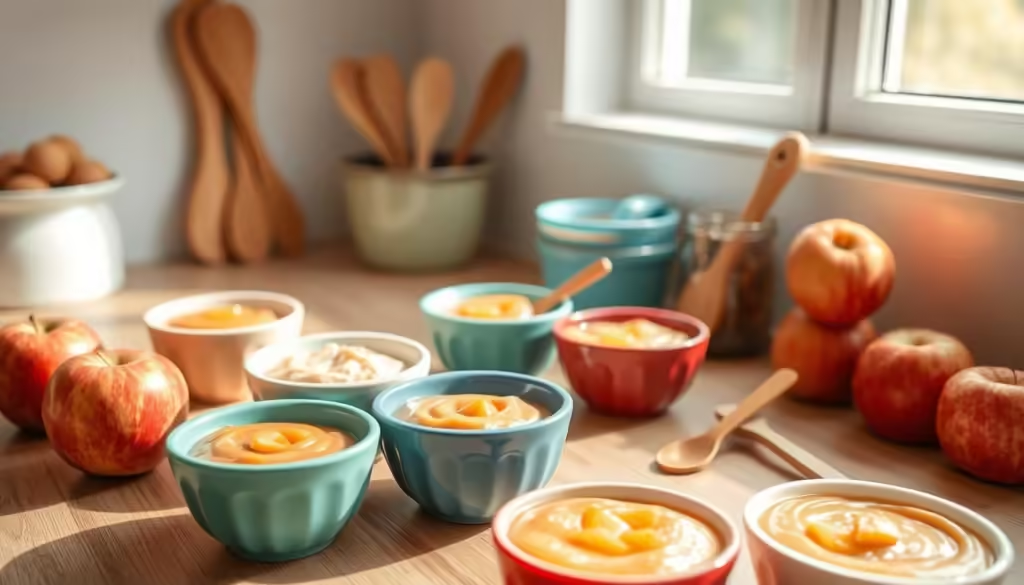
“Encouraging family meals from the first feeding can positively impact the development of children.”
Combining Apple Baby Food with Other Purees
Apple baby food is not only tasty alone but also great with other purees. Mixing it with other foods can introduce new tastes and textures. This makes mealtime exciting and nutritious for your baby.
Try apple puree with creamy avocado for a smooth treat. You can also mix it with roasted sweet potato or butternut squash. These combinations offer a mix of flavors and vitamins.
For a more filling meal, blend apple with peanut butter or cooked ground meat. These pairings keep your baby full and provide important nutrients for growth.
| Baby Food Combination | Nutritional Benefits |
|---|---|
| Apple + Butternut Squash | Vitamins A, C, and potassium |
| Apple + Sweet Potato | Vitamins A, C, and beta-carotene |
| Apple + Avocado | Healthy fats, vitamins C and E |
| Apple + Peanut Butter | Protein, healthy fats, and vitamin E |
Mixing apple baby food with other foods helps your baby try new tastes. This supports their health and development.
Apple Baby Food Variations and Add-Ins
Plain apple puree is great for babies, but you can make it even better. Try adding spices and herbs to change the flavor. This makes the taste more interesting and helps your baby get used to different tastes.
Spices and Herbs to Add Flavor
Spices like cinnamon, nutmeg, or ginger can make apple puree more exciting. They add a rich taste without being too strong. Herbs like mint or basil can also add a fresh, herbal flavor.
For instance, a little cinnamon or nutmeg can make apples taste sweeter. Ginger adds a nice zing. Mint or basil can cool down the apple’s tartness with their earthy taste.
| Spice/Herb | Suggested Amount (per 1 cup of apple puree) | Age Recommendation |
|---|---|---|
| Cinnamon | 1/4 teaspoon | 6 months+ |
| Nutmeg | 1/8 teaspoon | 6 months+ |
| Ginger | 1/4 teaspoon | 8 months+ |
| Mint | 1 tablespoon, finely chopped | 8 months+ |
| Basil | 1 tablespoon, finely chopped | 8 months+ |
Start with small amounts of new flavors and watch how your baby reacts. With a bit of trying, you can make many tasty apple baby food variations. These not only feed your baby but also help them discover new tastes.
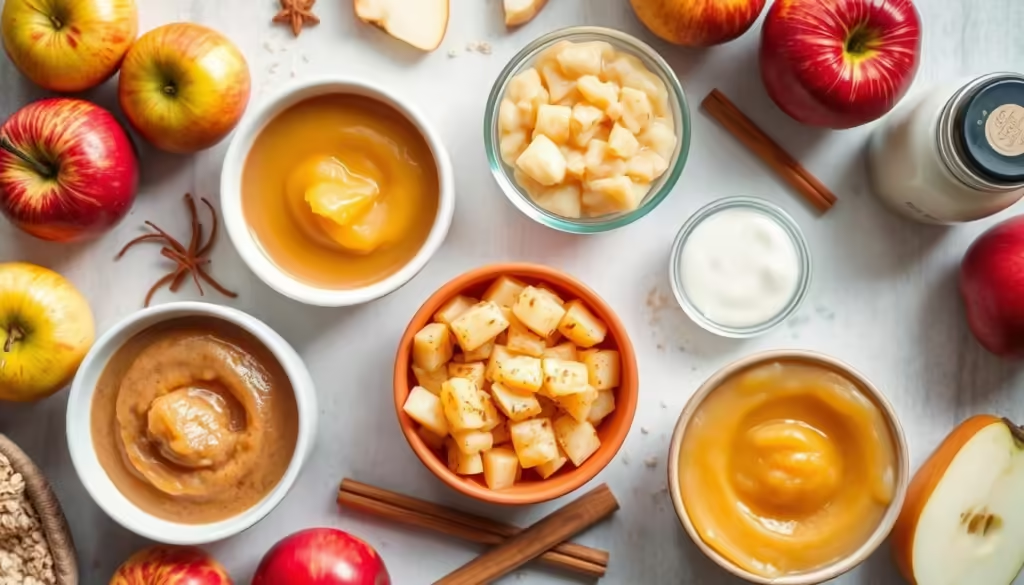
Baby-Led Weaning with Apples
Apples are a great choice for babies starting solid foods through baby-led weaning. This method lets babies feed themselves whole, soft foods. It helps them learn to eat on their own and improves their motor skills.
When you start apples for baby-led weaning, safety is key. Start with soft apple pieces or thin, grated slices. As your baby gets older, you can give them bigger, raw apple slices. Always watch them closely while they eat.
- Apples can generally be introduced around 6 months of age, as long as they are deseeded and cooked until soft.
- Offer grated, shredded, or boiled apple pieces for 6-9 month old babies to help develop their oral-motor skills.
- For babies 9 months and older, you can serve matchstick-sized raw apple pieces or cooked apple slices.
- Avoid raw apple slices for younger babies, as they can pose a choking hazard due to the firm texture and slippery nature of the fruit.
Apples are a great pick for baby-led weaning. They’re sweet, full of fiber, and packed with vitamin C. This vitamin helps your baby absorb iron from plant-based foods. With the right preparation and watching them closely, you can introduce this healthy fruit to your baby.
“Apples are a fantastic finger food for babies exploring the world of solids through baby-led weaning. Just remember to start with soft-cooked pieces and gradually introduce larger, raw slices as your little one’s skills develop.”
Conclusion
Homemade apple baby food is tasty, healthy, and simple to make. It’s a great first food for babies. By making it at home, parents can give their babies the best ingredients without allergens.
Apples are full of fiber, vitamins, and antioxidants. These nutrients help babies grow and develop well. This article gives you recipes, tips, and advice on storing apple puree.
Apples are a great food for babies, starting around four months. Cooking them takes about 20 minutes on low heat. Don’t refrigerate leftover puree to avoid bacteria.
Joining groups like BabyNama WhatsApp can help too. You get quick advice from pediatricians there.
Starting your baby’s apple journey is exciting. Apples are among the world’s top fruits, with over 2,500 types. Mixing sweet and sour apples helps babies get used to different tastes.
With the right preparation, apples can be safe for your baby. They’re a great addition to their diet.
FAQ
Why should I make homemade apple baby food?
Making your own apple baby food lets you pick the ingredients. This way, you know your baby is getting only the best. Apples are full of fiber, vitamin C, and antioxidants. They’re perfect for introducing solids to your baby.
What types of apples are best for baby food?
Choose sweet, firm apples like Gala, Honeycrisp, Fuji, or Pink Lady. Stay away from tart apples. They might be too acidic for your baby’s taste.
How do I make homemade apple baby food?
First, wash, peel, and chop the apples. Then, cook them until soft using steam or boil. After, blend them into a smooth puree with a blender or food processor.
How should I store homemade apple baby food?
Store it in the fridge for up to 4 days or freeze for longer. Use airtight containers or freeze in cubes for easy use.
When can I introduce apple baby food to my baby?
Always check with your pediatrician first. They’ll tell you when your baby is ready. Usually, it’s around 4-6 months.
Can I combine apple baby food with other purees?
Yes, apple puree goes well with many other purees. Try it with butternut squash, sweet potato, avocado, or peanut butter. It makes for tasty and healthy meals.
Can I add spices or herbs to apple baby food?
Yes, adding spices like cinnamon, nutmeg, or ginger, and herbs like mint or basil, can enhance the flavor. It adds depth without being too much for your baby.
Can I offer apple as a finger food for baby-led weaning?
Yes, apples are great for baby-led weaning. Serve soft apple slices or pieces. It helps your baby practice eating on their own.

